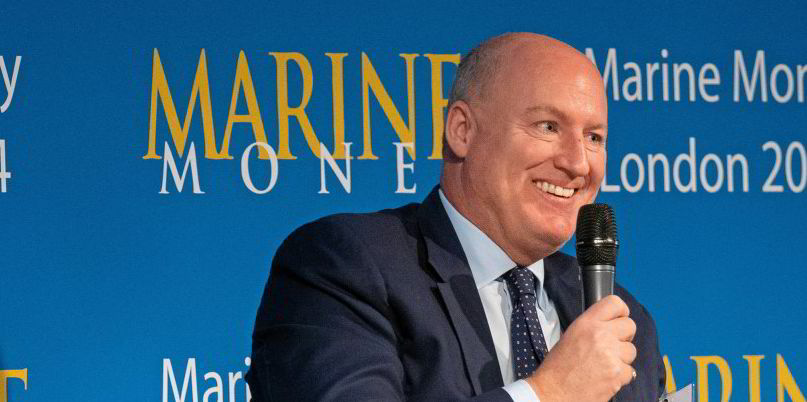Shipowners should not expect cheaper bank loan prices despite institutions being eager to lend and expectations that base rates will fall over the next year.
A group of leading shipping lenders said demands to meet new banking regulations and tightening decarbonisation targets mean loan prices will remain firm.
Paul Taylor, global head of shipping & offshore at Societe Generale, said: “Lending for lending’s sake has to stop.”
Banks will need “more bang for their buck”, in part to meet the tighter capital rules under the Basel IV banking rules that are being implemented over the next five years.
Even though there is “huge liquidity in the market”, Taylor told the Marine Money conference in London, “Basel IV is going to be a real game-changer.”
Major borrowers such as GasLog and Scorpio have completed big refinancing deals in recent months.
Bank loan deal flow has slowed in the last year, said Stephen Fewster, global head of shipping finance at ING Bank, as owners have used recent profits to pre-pay loans. Central banks hiked interest rates in the past two years to control inflation.
Fewster agreed that the cost of complying with Basel IV will be reflected in loan pricing.
The need for a better return will force banks to develop more revenue streams offering clients other products and services. ING expects base rates to fall by around 1.5% by the end of 2024.
Traditional shipping banks’ shrinking loan portfolios have led to intense competition between banks for business.
Christos Tsakonas, global head of shipping at DNB Bank, said there has been a “hunger for deals” from institutions. Smaller Greek lenders have been “at each other’s throats” on pricing.
“There is money for good projects. The same money is chasing fewer deals,” he added.
“Capital is out there,” said Vassilios Maroulis, managing director, global head of shipping, at Citi. “There is a misconception about the availability.”
The availability of capital from alternative finance providers had lured some shipowners to try to reduce or even eliminate their need for bank finance.
Anastassia Tcherneva, head of shipping clients at ABN Amro Bank, said she had spoken a week earlier to a client who was using alternative finance to deleverage, with the ultimate aim of not requiring bank finance.
However, falling interest rates may lure alternative finance away from shipping, leaving shipowners with a more limited pool of capital.
“Falling interest rates may see so-called alternative capital move to other sectors, and we might see some capital outflows,” Tcherneva said.
Banks can have a key role in funding the decarbonisation of the industry, the bankers agreed, although questions remain over which engine technologies to fund.
Taylor argued that alternative fuels must be the priority, not least to ensure banks meet their decarbonisation commitments.
Around 30 shipping lenders have signed up to align their portfolios with the International Maritime Organization’s mid-century net zero carbon target, while about 100 have signed the broader Net-Zero Banking Alliance guidelines.
Fewster said the need to finance ships built to burn conventional fuels would remain, but their owners would need to commit to broader decarbonisation targets to ensure portfolios were aligned with IMO targets: “We’ll still finance conventional fuelled ships, but we need to pressure owners on sustainability, as it’s very important to keep them engaged.”
Maroulis said retrofitting of existing ships will be an important factor in the next few years, although the challenge of building a decarbonised fleet is the long-term challenge.
“The size of what is required is huge in terms of rebuilding the fleet. There’s been nothing like it since the Second World War. There is a lot to do.”






